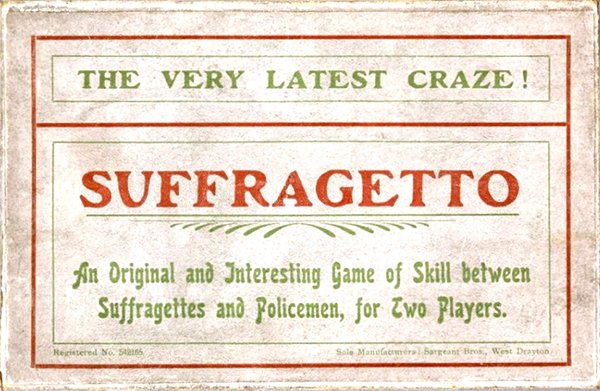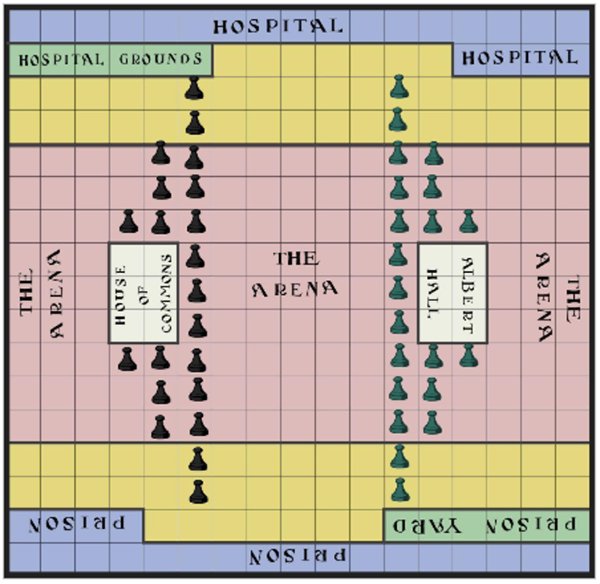5 Board Games That Tackled Serious Real World Issues
by Joshua Hay
History has shown us that it doesn’t always take wars or protests to change a person's worldview. Philosophy and the higher arts were virtually invented to do that without ever picking up a weapon. But sometimes you find deep messages in the most unexpected places ... and as far as "unexpected" goes, board games have to be pretty high on that list.
The Colonialist RPG Designed To Make Players Squirm
Tabletop games have a complex association with colonialism, which often means they’re blatantly blind to history and generally racist. The classic Puerto Rico, which was the #1 board game for years on the nerd haven boardgamegeek.com, casts players as the colonizers but erases the slavery part despite putting people in charge of plantations. It’s a decent bet that any entry in the popular genre of “Board Games Named After Places” is about the players being the oppressors of that land.
The role playing game Dog Eat Dog goes out of its way to correct that course. Think Dungeons & Dragons, but during colonial times and with a reality enema. Dog Eat Dog’s subtitle is “A Game Of Imperialism And Assimilation On The Pacific Islands,” and it accomplishes this course correction by making players as uncomfortable as possible. One of the first rules you have to follow is that the “richest player” is the occupying force, which we presume is determined by everyone whipping out their bank balances and stock portfolios.
Also, you have to make your dog eat another live dog. It gets pretty surreal.
It only gets worse from there. The concept behind the theme isn’t very subtle, and in fact you are instructed to keep this on everyone’s mind throughout the game: the natives are inferior to the occupiers. No, seriously, it's in the rules:
And that's how Shia LaBeouf was created.
The natives add more specific rules based on their interactions with the occupiers as the game goes on, but this is what guides the course of play throughout. When any rule is broken, natives must give a token to the colonist. When a native submits to the colonist in order to follow rules, the colonist gives them a token.
It’s a back and forth where freedom for the natives means giving up their possessions, and being gifted anything by the colonists means submitting to them. It joins a growing list of games that are trying to shed light on the atrocities of our past, and to reclaim some of the humanity for people who were denied it, like Spirit Island or Freedom: The Underground Railroad.
The Period Game Could Be Invaluable For Young Girls
The Period Game, with its large representation of the female reproductive system and marbles that you spill out of ovaries, knows it looks ridiculous on the surface. In a way, that’s the point. After all, a giant penis centerpiece would be just as crazy, and probably sounds like a better fit for bachelorette parties.
But there’s a stigma around periods and female reproduction, which makes it incredibly hard to discuss. Especially when you're a preteen, and every sex-related subject is the height of embarrassment. Having giant ovaries as the centerpiece means that girls won't feel like the most embarrassing or conspicuous thing at the table, even as they begin frank discussions of their anatomy like The Period Game aims to encourage.
"Fine, you can play, Chad. But you have to bring 5 pounds of chocolate."
Each round, players will turn one of the ovaries at the top and cause a marble to fall out. If it’s red, you’ve started your period. If it’s white, “better luck next time,” the site says. Players progress around the track with pieces modeled after pads, tampons and other period-related products. They’ll encounter relatable setbacks told in a clear, frank manner like “Oops ... You leaked. Go to the nurse's office.” It also stresses common pain coping methods like taking a hot bath, as well as the need to have sanitary products on-hand in order to deal with the periods when they come.
It’s not a complex game, but that’s because its job is helping young women prepare for one of the most complex and confusing times of their lives. The game made waves with a Red Dot award in 2016 but is still currently seeking funding to produce a full printing. If you're interested in helping fund it or becoming a partner, you can contact them at the bottom of the page.
Experience The Thrill Of Late 1980s Polish Grocery Shopping
For a hobby where medieval subsistence farming ranks among the highest of thrills (#17 to be exact), Kolejka still manages to be the most mundane offering -- at least on its surface. Published by the Institute Of National Remembrance in Poland, the game promises to be an accurate and educational reproduction of the experience of waiting in long grocery lines during the tail end of the Communist era. The title literally means “queue,” and attempts to bring you the frustration of Black Friday coupled with the possibility of starvation.
They should make you wait in line for 22 hours in order to buy the game.
Players have a set of pawns that they place in locations to try and gain goods. Those areas, however, are crowded with other pieces, forming lines that push out of the store and deep into streets. You’ll have to play a variety of event cards like “Mother carrying small child” to push ahead in the lines, or even deal with hazards like “Delivery error” that may jeopardize your ability to get goods.
Of course, even if you do manage to find your way to the front of the line, it’s not certain that what you need will actually be there. That’s why there’s a black market with steep prices and the ability to barter. The item cards feature actual images of Soviet-era goods, so that you can feel a little more connected to that empty table or those plain, tattered shoes as you play.
You Can Remake The Game That Trained The CIA To Hunt El Chapo
A little over a year ago, the CIA revealed at South by Southwest that they had created multiple board games to assist in a variety of training objectives for their members. Thanks to a California entrepreneur’s FOIA request, all the necessary materials to play them have been published and uploaded online.
Collection Deck is a pretty typical game reminiscent of the popular board game Pandemic, or like Plague Inc. for you mobile game-lovers. In it, players utilize a limited number of actions as well as the resources provided by their cards to circumvent a variety of man-made and natural disasters before an in-game timer crashes down on them.
The real bombshell in this release is the other game: Kingpin, The Hunt for El Chapo. Volko Ruhnke (a big name designer of war games like Labyrinth: The War on Terror, 2001 - ?) was recruited for this design. One team plays as the cartel trying to evade capture while performing jobs to keep their boss happy. The other represents the hunters trying to track down the members of the cartel by sending agents across Mexico.
"Dibs on playing the angry director who only gives them 24 hours to solve the case!"
The game is so secretive and complex that it requires an intermediary to pass information between the two teams and track the game state across two separate boards, each one hidden from the opposing team. However, when career designers Dominic Crapuchettes and Jason Matthews reviewed the game, one of their biggest criticisms from a commercial standpoint is that it wasn’t complex enough. Kingpin’s rules fit on a measly 5 pages, while the hardcore war gaming crowd is accustomed to rule books of 50 pages and higher.
If you can make sense of the scribbles, jargon, and poor resolution of the provided files, both Kingpin and Collection Deck can be yours (that is, if you have enough paper, printer ink, and patience). But not entirely -- some aspects of these games were so sensitive that they had to remain classified before release, leaving nothing but contextless numerical info in their place.
Chess For Radical Suffragettes
Board games made to train institutions are cool, but board games made to take them down a notch are even cooler. That was the aim of Suffragetto, a board game for radical suffragettes that was released in 1908.
It’s sort of like chess in that each side will receive a number of pieces that are heavily abstracted representations of real world things. In chess, they’re monarchical figures and combat units. In Suffragetto, they’re police and oppressed women. Players use simple rules to move them around the board while attempting to accomplish a goal. In this case, that goal is a checkmate via women invading the House of Commons, or the police invading the feminist meeting place at Albert Hall. While the political thesis behind chess is vague or even nonexistent, Suffragetto’s is as subtle as an N.W.A. Song.
The game was designed by the Women’s Social and Political Union (WSPU), known for disrupting social events, government meetings, and even setting fire to things. When progress wasn’t advancing fast enough, the WSPU was there to speed things along. They were kind of like the Black Panthers of women’s suffrage.
Only one known copy still exists, and it’s available for viewing at Oxford Bodleian Libraries. It’s used in an exhibit about games that taught children about British politics and the British worldview throughout history. Archaeological discussions on the game point out that making the police and women equal in strength was intentional. It provided bodily autonomy and reinforcement to women’s self image.
Of course, if radical opposition is a factor, it explains why there's only one copy left: if you were losing, you'd likely flip the table and then set it on fire. We would. Then again, we do that with most games.













